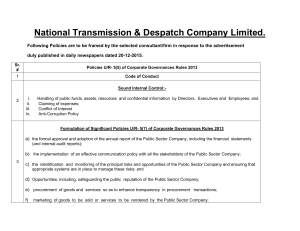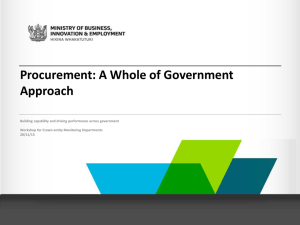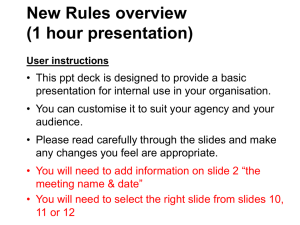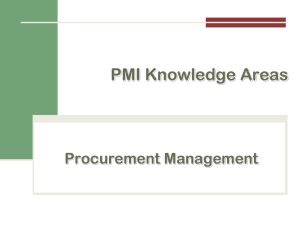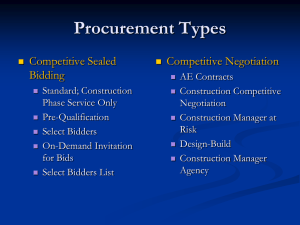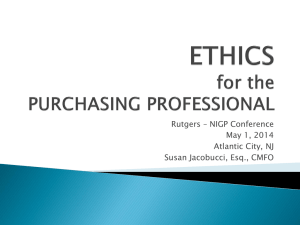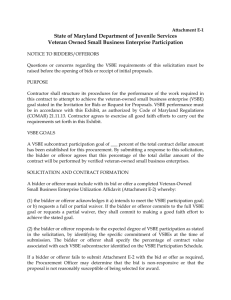Voight Shealy - The South Carolina Society of Certified Public
advertisement
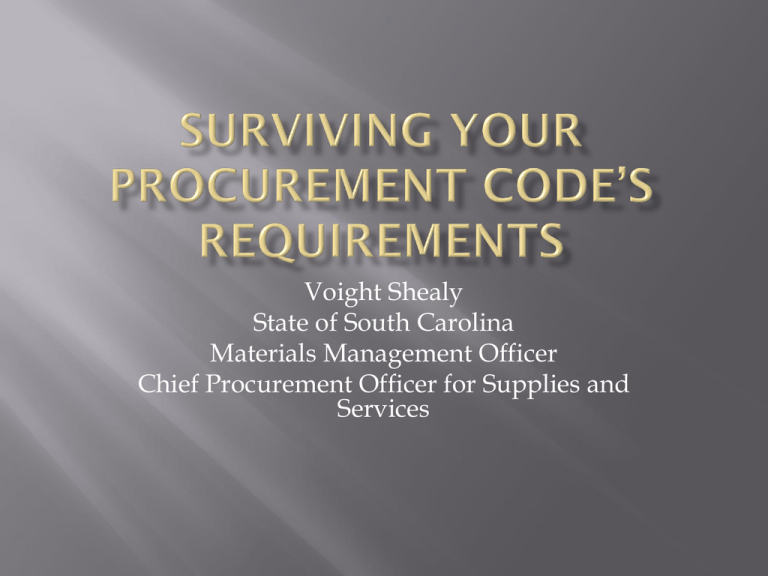
Voight Shealy State of South Carolina Materials Management Officer Chief Procurement Officer for Supplies and Services 1979, American Bar Association produced its Model Procurement Code for State and Local Governments 1981, State of South Carolina adopted its Consolidated Procurement Code 24 other states have adopted some form of the ABA’s Model Code Source: NASPO’s 2012 Survey of State Government Procurement Practices All states have adopted procurement codes Ours requires political subdivisions to adopt model ordinances If you expend federal funds, you must follow your procurement policy or the Federal Acquisition Regulations It’s the buyers v. the sellers ladies and gentlemen What do you think? To protect the citizens of our states from you and me. It was caused by someone else's transgressions Know Your Authority Every state has a central purchasing office In SC, it’s the Budget and Control Board Procurement Services Division 3 Chief Procurement Officers Information Technology Management Officer – Mike Spicer State Engineer – John White Materials Management Officer – Voight Shealy Vary from state to state Some are more centralized Some are more decentralized Most are center lead To process procurements of the highest complexity as well as statewide term contracts and multi-state cooperative purchases to save money on common items and services used by most agencies. Large, complex agency buys. State term contracts 1) to aggregate various agencies’ needs into very large buys for discounted pricing 2) So 100 agencies don’t have to Determined by Each Agency Know your personal authority To manage procurements for: Routine needs Agency expertise Varies state to state from $2,000 to unlimited In SC, Every State Agency’s authority - $50,000 Higher Limits May Be Requested All you have to do is hire a competent procurement staff and follow the Code Learn how to write unambiguous specifications that accurately describe the products you need or the services you require. Describe what you need What should it do? How fast? Heavy or light duty? How big? How tall? How long? Do you care? Don’t spec it if you don’t need it Spec Quality Necessary Low Bid Does Not Mean Cheap! For products, most common specifications are "Brand Name or Equal" specs Name an acceptable make and model or two to describe the quality needed List Salient Features Desired What distinguishes this model from all others? Allow bidders to offer the models listed or other “equal” products Describe what services you need What must the contractor do? Be Specific! Spec qualifications required i.e., Do you want a licensed contractor? How fast should the response time be? How many staff should be devoted to your job? Past experience requirements? Always require references – Check Them It is vital that your Scope of Work is clear in defining what you expect your contractor to do. It is vital that you are clear in stating what must be covered in each bidder’s price Be precise Should Be Open and Competitive. But: Every specification imposes a requirement. Therefore, it may limit competition. If necessary, that is fine. But, it cannot be unduly restrictive. It's OK to Seek Info From Vendors Before You Solicit It’s all about building successful contracts Know your Code’s authorized source selection methods Small Purchases Competitive Sealed Bidding Competitive Sealed Proposals Emergency Sole Source ALL PROCUREMENTS MUST BE MADE BY ONE OF THE METHODS LISTED ABOVE. In SC, <$50,000 Competition Required <$2,500.00 - None $2,500.01 - $10,000.00 - Call for 3 Written Quotations $10,000.01 - $49,999.99 - Advertisement in South Carolina Business Opportunities DO Be Consistent With Specifications Call the Required Number of Vendors Document Calls - Write them down DON’T Tell Competitors What Other Vendors Bid Split Orders Formal process for $50,000 or more Written solicitations request written bids Award - Lowest Responsive & Responsible Bidder DO Allow Bidders Adequate Time to Develop Bids Make Sure Low Bidder is Responsive and Responsible Don’t Base your specifications on a single vendor’s product Make your specifications overly restrictive Evaluation - Team Scores of Proposals Judged Against Weighted Factors i.e., past experience with similar projects, innovation in solving our problem, team qualifications, financial stability Award - Highest Ranked Offeror, not necessarily lowest cost State your problem - Buy solutions! Allowed only in emergency situations - Threats to Public Health, Welfare, Critical Economy or Safety Written Determinations Often Required Authorized Approval Required DO Plan Your Requirements Explain the Emergency - What happened? Compete as Practical DON’T Shoot Yourself in the Foot! “This annual event” – REALLY?! Unique Item or Service and Available From Only One Source It’s not the source we like the most Written Determination Often Required Authorized Approval Required DO Search for Competitors Document Efforts to Find Competition How do you know it’s a sole source? DON’T Play a Bad Hand - if in doubt, compete it Protect Yourself People are watching As a public manager, it is your duty to ensure that you and your employees comply. Every state (except Massachusetts) has a protest process In SC, Protests - $50,000 or more Solicitations - Any Prospective Bidder or Offeror Awards - Any Actual Bidder or Offeror Contract Controversies - State or Vendor May File State Auditors Legislative Auditors Other Auditors In SC, Audit and Certification - Performs compliance audits of procurement activity Taxpayers



